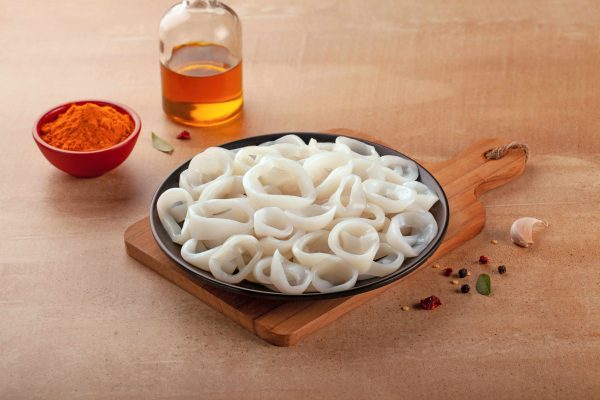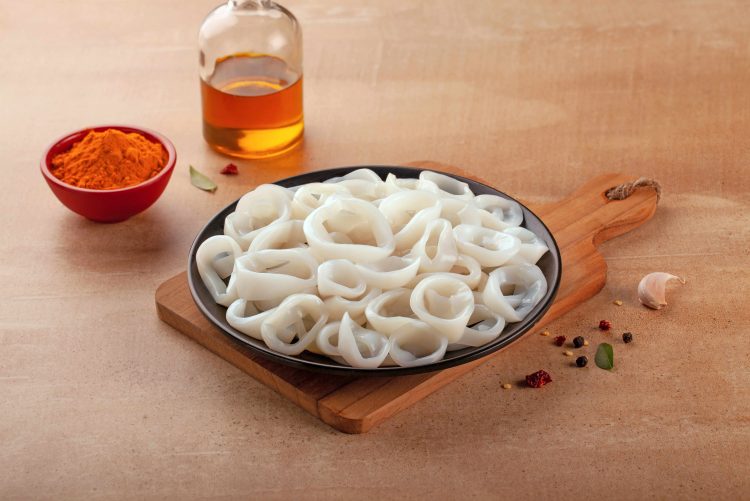The Kadamba Fish is known by many names. It is popularly called ‘squid’ worldwide and is enjoyed in many forms, be it pan-fried, deep-fried, curried or raw. If we speak only of India, the names for squids include Kalamari in Hindi, Kaamuta Sanchulu in Telugu, Koonthal or Kanava in Malayalam and Bondaas in Kannada.
More than 300 species of the Fish Kadamba or squids are found mainly in the coastal areas. Kadamba can be identified by their long, tubular bodies and short heads. They feature two tentacles and eight arms, along with two large eyes. Squids are somewhat similar to octopuses but have tiny skeletons that look like a rod. Additionally, a few species of squids can change colour to signal prey, while many others discharge black ink to distract predators.
In many countries, you can find various Kadamba fish laid out for customers to choose from based on the type of dish they wish to prepare. They are primarily available in the eastern Pacific, the Mediterranean, the southwestern Atlantic, and Japan.
What are the Various Types of Fish Kadamba?
With a tubular body and long fins, the Kadamba Fish can be found in various sizes and features. However, some of the popular types that also may be easily found in commercial spaces include:
- Colossal Squid: Known to be the largest squid species on the earth, the enormous squid can weigh up to a whopping 455 kgs! Their length can also go up to 35 feet, making them pretty unique among the lot. Additionally, the eyes of this species of squids are the largest in the entire animal kingdom!
- Glass Squid: This squid species is magnificent because, as the name suggests, they look like glass with bulging eyes, short arms and swollen bodies that make them look different and unique from the rest.
- Japanese Flying Squid: Also called the Japanese Common Squid, this species is a member of the Cephalopods family, similar to cuttlefish and octopus.
- Humboldt Squid: This is a species predatory to the warm waters of the eastern Pacific ocean. They are popular in northern Alaska and are also famous by the name Jumbo Squid due to their size. They boast 1.2 m mantles and can weigh about 50 kg.
- Vampire Squid: This species of squid has the same number of arms and tentacles as the other squid. And no, it does not suck blood. It gets its name ‘Vampire’ because of its dark colour and skin, which connects the arms, making it look like a cape.
What are the Kadamba Fish Health Benefits?
There are plenty of Kadamba Fish Benefits to enjoy with every bite. Some include:
- They are rich in protein and have a low-fat content
- They contain phosphorus, iron and Vitamin C
- They are a good source of omega D3 and omega 6 fatty acids
- They strengthen the heart and boost brain health

| Prep Time | 10 minutes |
| Cook Time | 10 minutes |
| Servings |
people
|
- 250 grams of Licious Squid Rings
- 1 tbsp Salted butter
- 6 garlic gloves chopped
- 1 tbsp Spring onion chopped
- Parmesan Cheese
- fresh coriander chopped
- Salt as per taste
- ½ tsp Freshly ground pepper
- ½ tsp Lemon Juice
Ingredients
|
   |
- Take a pan on medium heat and add butter, garlic, spring onion and coriander and saute well till the garlic turns brown
- Turn the heat high and add the Licious Squid Rings. Stir well to cook for 3 minutes or till the squid is cooked
- Add some parmesan cheese and lemon juice and mix well
- Garnish with more spring onions and serve hot!
Order your Kadamba Fish Online at Licious to prepare this recipe and don’t forget to tag us on Instagram using #MadeWithLicious. Our seafood and fish items are caught daily and delivered to your doorstep, assuring you of freshness and quality. Our squids are never frozen and they are kept between 0-4°C temperature to maintain freshness. Moreover, they are cut, cleaned and vacuum-packed by our team of highly trained technicians.

